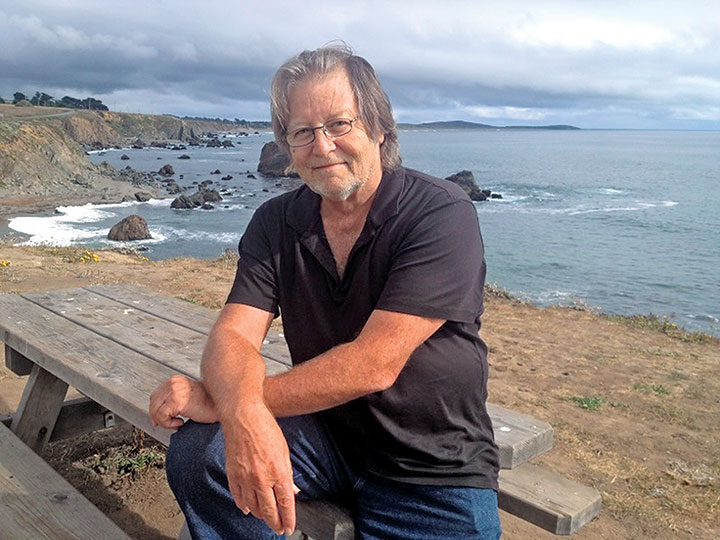Carson Kievman *03 Stretches the Boundaries of Opera
The opera will add to a far-reaching and ambitious body of work that spans several decades: All told, Kievman has written 23 multimedia opera and musical-theater pieces, along with seven symphonies, and various other pieces. “When I write a piece of music … I want people to be inspired,” he says. “I hope people experience my work without judgment or preconditions.”
From the start, Kievman’s compositions have defied conventions. In a work he wrote and staged at the 1979 New York Shakespeare Festival, audiences saw a pianist perched high atop a rickety platform sway back and forth while performing what a reviewer called “an amalgam of panic-stricken tonalities,” aided by a page-turner dressed like a butler. Teetering on the edge of collapse, the pianist’s shaky perch triggers a group of clanging bells before the whole set disappears behind a huge mirror that rises from the stage floor.
Kievman hasn’t narrowed his sights since then. In 2015, his opera Intelligent Systems: The Surrender of Self in Mystical Contemplation was, by all accounts, a mind-stretching multimedia spectacle. A Miami Herald review described the subject of the work as “nothing less than the evolution, destruction, and rebirth of the universe. A space ship is launched and enters a time warp as gases form into planets. This tale of a parallel world traces the first forms of life destroyed by natural catastrophes and the gradual evolution of early man, the rise of oppressive dictatorships, the birth of cities, war and disease, corporate greed, climate change and manmade catastrophe.”
Two years later, Kievman debuted his opera Tesla, which tells the story of 19th-century inventor Nikola Tesla, an immigrant whose ideas challenged the power structure of the Gilded Age. Tesla, a competitor of Thomas Edison, among others, gave away many patents and went to work on developing a source of free and nonpolluting energy. He died a pauper.
“I don’t want to bang people over the head [with] what I believe,” Kievman says. Instead, he says he hopes “they’re enjoying what they’re experiencing, but in the process, they learn about these other things.”
Kievman, who describes himself on Twitter as “a Flying Jigsaw Puzzle and Peripatetic Aristotelian Philosopher/Composer,” was born and raised in Los Angeles. His father was an actor, his mother a jazz singer. He began writing songs around age 13.
His parents divorced when Kievman was very young, and his mother took her own life when he was 17. The emotional turmoil he endured as a youth drove him to compose Wake Up, It’s Time To Go To Bed, a multimedia opera that premiered in 1979 with Keith Carradine in the lead role.
Kievman rejected his father’s advice to make easy money writing music for commercials, for fear that he’d be sucked into the commercial world and never come out. His compositions grew more socially conscious during the six years he spent getting his doctorate in composition and music theory at Princeton. While on campus, he wrote Symphony #4, Biodiversity. Later works have dealt with themes such as humankind’s power to destroy the Earth (Intelligent Systems) and mental illness (Fairy Tales: Songs of the Dandelion Woman).
Kievman has obtained many commissions and fellowships in the United States and Europe, and in 2005 co-founded the SoBe Institute of the Arts in Miami Beach. That organization has been credited with developing audiences and opportunities for artists in South Florida. SoBe is “working to make the arts accessible to people by making it affordable — always trying to make our ticket prices match a movie ticket price,” Kievman told an interviewer in 2017. “The goal has always been to present world and Florida premieres as well as other new work — this is the hallmark of a true cultural city.”












2 Responses
Carl Kruse ’86
4 Years AgoRemembering Carson Kievman
Carson Kievman *03, adventurous composer and music educator, is dead at 72. I was on the board of Carson's Sobe Arts Institute and learned much about music and life from Carson and am heartbroken he is no longer with us. I wrote a tribute/obituary to him here: https://carlkruse.org/carson-kievman-is-dead-at-72/
Carson Kievman *03
5 Years AgoThank You
If I didn't say this before, I thank the Princeton staff and writer Matt Zencey for this wonderfully written short document of my life in the context of my life's work. Thank you.
Cheers,